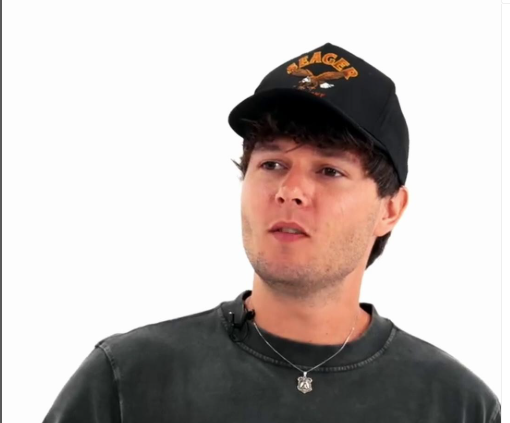Zach Justice’s rise in wealth has not happened by chance. He went from being an online performer to a true digital entrepreneur with remarkable success in creating several revenue sources. In an overcrowded influencer market, he has carved out a niche that feels very genuine by utilizing humorous timing and a highly adaptable content approach. Given that he only recently entered the internet world, his estimated net worth—which ranges from $2 to $3 million—is quite remarkable. Notably, his podcast, Dropouts, has developed into a crucial medium that consistently generates ad revenue in addition to audience devotion.

Zach has shown how contemporary producers may be incredibly adaptable in their engagement across platforms by broadening his content portfolio. Each platform strengthens the cultural impact of his brand, from the short wit seen on TikTok to the lengthier, narrative-driven formats on YouTube and Spotify. These calculated additions have greatly increased his cross-platform visibility and financial worth.
Zach Justice Profile Table
| Category | Details |
|---|---|
| Full Name | Zach Justice |
| Date of Birth | 1995 (Exact date not public) |
| Age (2025) | 29 years old |
| Birthplace | Las Vegas, Nevada |
| Nationality | American |
| Height | 6 ft 2 in (188 cm) |
| Relationship Status | Single |
| Siblings | Brother: Laylay |
| Occupation | Influencer, Podcaster, Actor, Writer |
| Major Platform | TikTok, YouTube, Dropouts Podcast |
| Notable Series | Burb Patrol, Best Foot Forward, The Re-Start |
| Estimated Net Worth | $2 to $3 million |
| Revenue Streams | Sponsorships, YouTube Ads, Podcast Ads, Merch, Acting |
| Active Years | 2018 – present |
| Notable Traits | Comedic timing, media versatility, strategic brand deals |
Zach has benefited financially from high-profile sponsorships and merchandise sales, which cannot be overlooked. Brands find his tone approachable, frequently amusing, and always responsive, recognizing his appeal to Gen Z and millennial audiences. Zach has developed a following that actively promotes his work in addition to being a consumer by associating with relatable, youth-focused labels.
Zach has made significant strides in his career in recent months by branching out into television and movies. This change started in 2021 when he played “Derek” in six episodes of Burb Patrol. Fans reacted enthusiastically to his performances, which were surprisingly natural for someone who was raised on internet platforms. His next initiatives, such as Dead of Night and The Re-Start, are especially intriguing not only because of what they are but also because of what they stand for: a creator venturing into traditional media and overcoming the limitations of short-form digital material.
Creators like Liza Koshy, Emma Chamberlain, and King Bach have all expanded their impact into entertainment verticals, and this shift toward scripted television and cinema is comparable to their actions. This migration pattern demonstrates how digital artists are changing the definition of staying power. This pattern has significantly boosted Zach’s career, as each acting role increases his reputation outside of social media.
Zach’s comedic repertoire has only grown as a result of his collaborations with contemporaries and reliable friends, such as his co-hosts on Dropouts. Like sketches on Saturday Night Live or improv groups, his material thrives from co-creation, where ideas flow spontaneously and humor develops organically. This spirit of cooperation is what distinguishes his podcast from other influencer content and makes it very creative.
Zach’s conscious decision to keep his love relationships private feels refreshingly realistic, even though his personal life is still mostly hidden. This moderation feels particularly mature in the context of influencer culture, when excessive sharing frequently encourages engagement. Zach preserves a feeling of secrecy that raises the professionalism of his business by staying away from needless controversy and concentrating on the important things.
He often responds to fan questions with fun and charm, covering anything from his height of 6’2″ to his background in Las Vegas. Even if they are humorous, these exchanges support his capacity to be approachable. His answers are very clear and consistently strike a balance between being approachable and having boundaries. His ability to combine poise and candor has made him a trusted influencer.
In terms of influence, young artists negotiating the unstable landscape of digital media will find Zach’s success story very helpful. He is evidence that comedy can be extraordinarily profitable when combined with self-control and a keen business sense. By emphasizing replayable content, such as humorous sketches or podcast conversations, he has amassed a body of work that makes money long after it is posted.
Zach’s ascent symbolizes the ephemeral nature of celebrity from a cultural perspective. Today’s celebrities reach their followers directly and build their following naturally, unlike traditional celebrities who historically depended on publicists and movie studios. Zach has been able to adjust to this format far more quickly than some of his colleagues, which has allowed him to change with the digital world rather than be absorbed by it.
His recent foray into acting could also act as a model for online producers looking to gain acceptance in conventional entertainment venues. He is already changing how influencers are viewed in Hollywood by studying hard for roles and trying out various acting techniques. This reflects a larger trend in which artists are being accepted more and more as genuine performers rather than as tricks in the mainstream media.
